
EU, Saudi Arabia ‘share same concerns, agree on way forward’ in Horn of Africa, bloc’s special envoy tells Arab News
Concomitantly, the region, including the Red Sea, faces challenges that go beyond national borders, including conflict, violent extremism, human trafficking, forced displacement, COVID-19 and environmental stresses.
As the EU’s special representative for the Horn of Africa, Annette Weber’s main job is to promote the bloc’s policies and interests in the region, including the Red Sea, and the individual countries there. Special representatives play an active role in efforts to consolidate peace, stability and the rule of law and support the work of the office of the EU’s high representative for foreign affairs and security policy.
During her visit to Saudi Arabia this week, her first to the Kingdom since being appointed to her post on July 1, Weber had what were described as “very fruitful discussions” with Minister of State for Foreign Affairs Adel Al-Jubeir; Minister of State for African Affairs Ahmed Abdul Aziz Kattan; Abdullah Al-Rabeeah, supervisor general of the King Salman Humanitarian Aid and Relief Center; and Sultan Al-Marshad, the CEO of the Saudi Fund for Development.
“The reason for my mission here to Saudi Arabia is to have a better understanding of the Saudi position on the Red Sea and to exchange views on the current situation in Sudan and Ethiopia,” Weber said during an exclusive interview with Arab News.
“I think we are aligned on almost everything. We share the same concerns but we also (agree on) the way forward, what we need to do and how to engage. We had very fruitful, very positive meetings.”
But does Saudi Arabia, the backbone of the Gulf Cooperation Council, have any role to play in the EU’s pursuit of its goals in the Red Sea and the Horn of Africa?
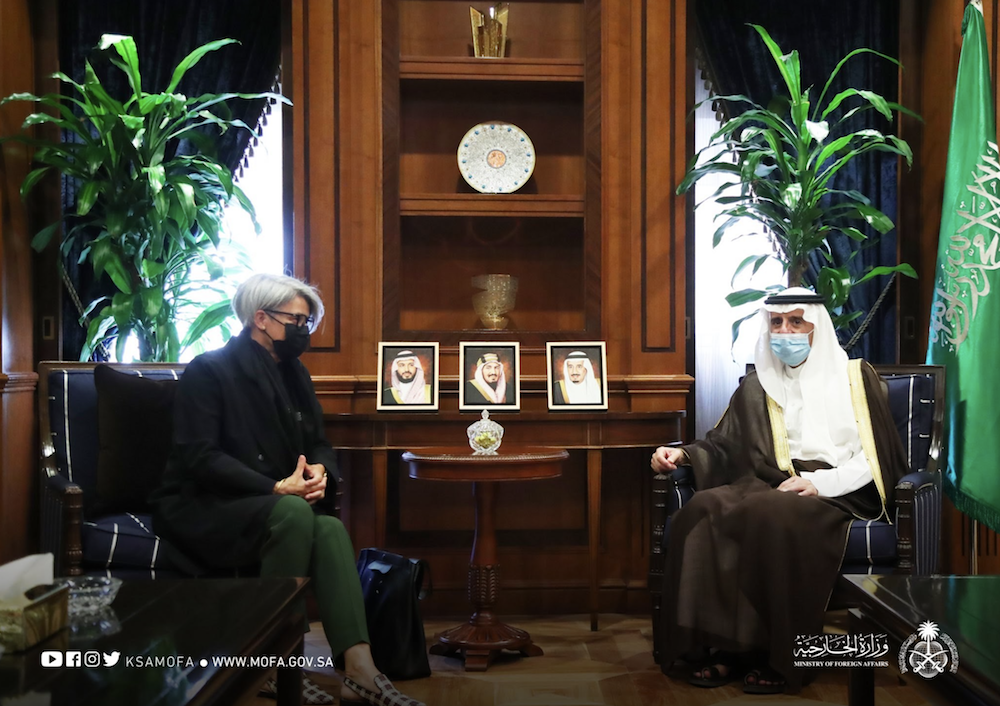 During her visit to Saudi Arabia this week, her first to the Kingdom
since being appointed to her post on July 1, Weber had what were
described as “very fruitful discussions” with Minister of State for
Foreign Affairs Adel Al-Jubeir.
During her visit to Saudi Arabia this week, her first to the Kingdom
since being appointed to her post on July 1, Weber had what were
described as “very fruitful discussions” with Minister of State for
Foreign Affairs Adel Al-Jubeir.
“Absolutely,” said Weber, citing the objectives of the Council of Arab and African Countries Bordering the Red Sea and the Gulf of Aden, which was set up in January 2020 with the objective of securing the waterways. The council, which in addition to Saudi Arabia includes Egypt, Jordan, Eritrea, Yemen, Sudan, Djibouti and Somalia, aims to increase cooperation between the countries in efforts to tackle piracy, smuggling and other threats to international shipping routes.
“The council is a flagship and I hope that we can find common interest there,” said Weber. “For us in Europe this is the main trade route to Asia, carrying 23 to 30 percent of our trade. We have a common interest in ensuring maritime security, checking piracy and fighting jihadists who operate from the shores.
“We have more than one common interest. The Red Sea is really much more a connector than a divider. It is very interesting to see that also in the relations between the Gulf states, specifically Saudi Arabia, and the Horn of Africa.”
On her way to Riyadh, Weber stopped in Bahrain to take part in the International Institute for Strategic Studies’ Manama Dialogue, an annual high-level forum at which the Middle East’s most pressing security challenges are discussed.
She spoke during a session titled “Security Dynamics in the Red and Mediterranean Sea,” a topic of considerable importance now that the Council of the European Union intends to reinforce its partnership with the Horn of Africa and establish a new strategy for the region.
“My mandate as an EU special representative is to connect the dots between the countries of the Horn of Africa and the Red Sea area,” Weber said. “It is not just about crisis diplomacy but more about (expanding) the potential of the region, about bringing together the main countries in the Horn and the main countries of the Gulf.
“This depends on what kind of issues we are dealing with. When the matter is a negotiated ceasefire, for example, we work very closely with the Americans but also with the Gulf states, the African Union and the UN. So the multilateralism is dynamic in this region. This is where my interest (as the special representative) lies, very well reflected in our common reading of the situation but also in the potential solutions.”
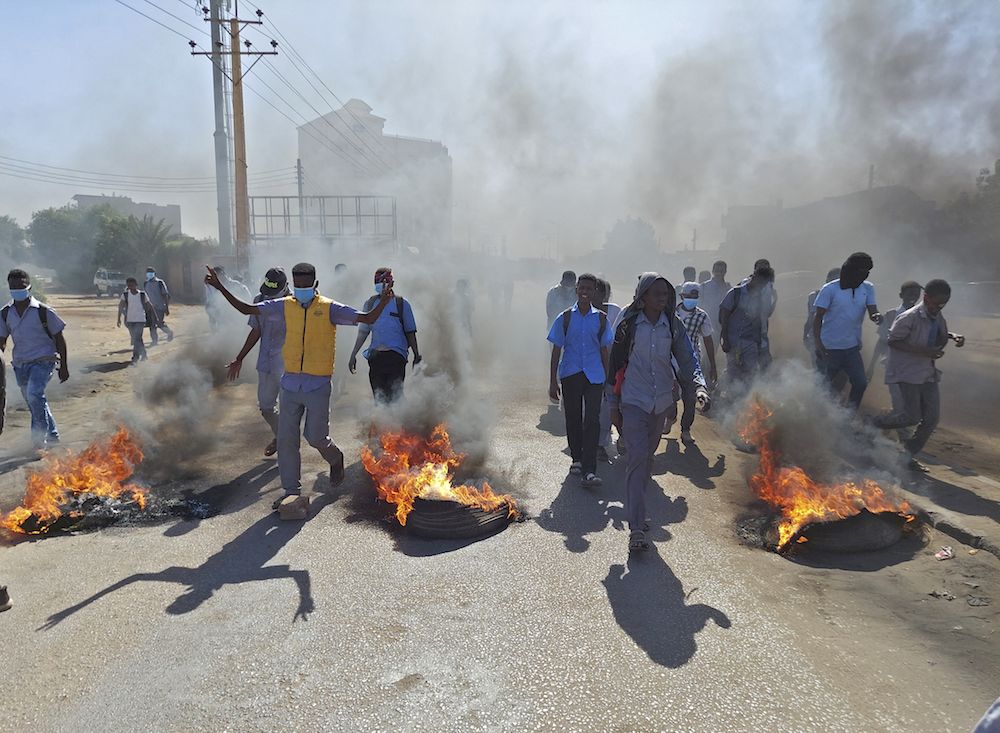 Sudanese protesters walk past burning tyres during a demonstration
calling for a return to civilian rule in 40th street in the capital's
twin city of Omdurman.
Sudanese protesters walk past burning tyres during a demonstration
calling for a return to civilian rule in 40th street in the capital's
twin city of Omdurman.
Since 2011, the EU has been one of the world’s largest donors of humanitarian assistance to the Horn of Africa, pouring millions of euros into projects in five countries besides Sudan. Weber said the bloc would rather move on from humanitarian to development projects.
“When I look at Ethiopia, there is no reason for it to have humanitarian aid because it has good education,” she said. “The potential is good. We have been investing in reforms. If there was no war, if there was no conflict, we would be extremely happy to move on from humanitarian (aid) to investment, to bring what is necessary, what they choose for themselves, offer the people a future.
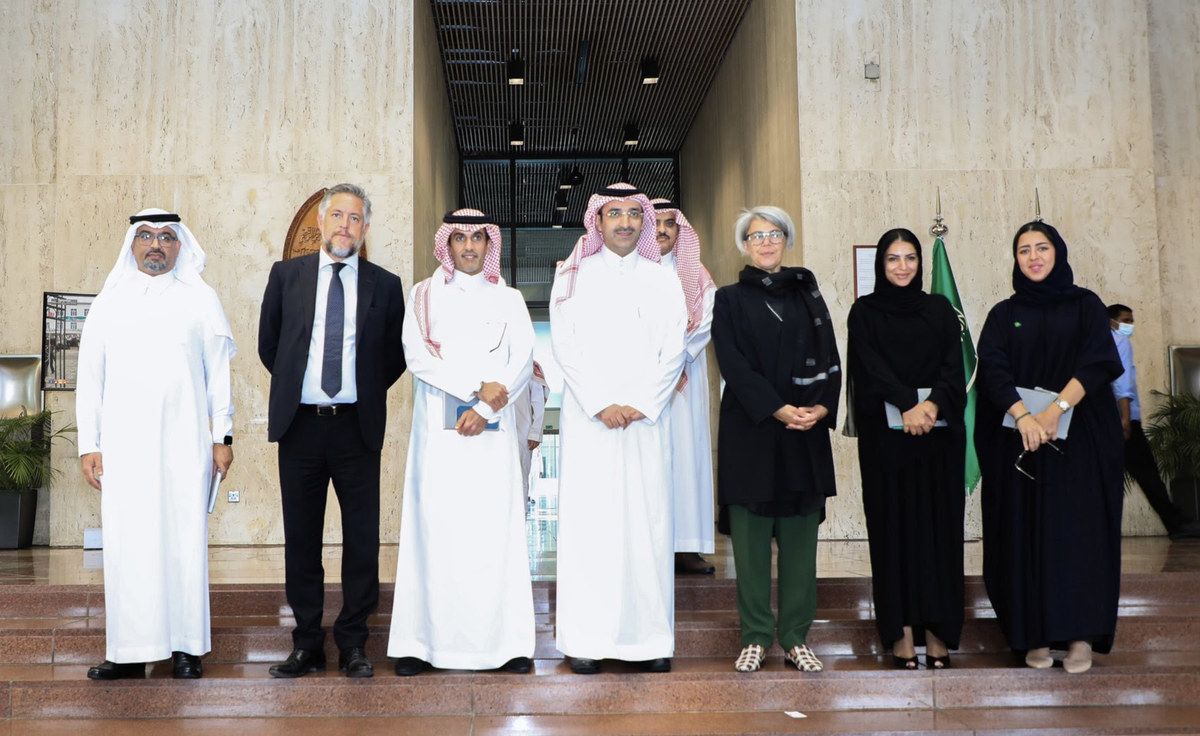 Annette Weber poses for a photo with the Saudi Fund for Development team.
Annette Weber poses for a photo with the Saudi Fund for Development team.
“We are not satisfied that there is so much need for humanitarian aid. But we see, for example in Somalia, indeed in the entire Horn of Africa region, climate change, locust infestation and a number of other triggers for humanitarian aid that are not man-made but specifically related to conflict.
“This is where we are not satisfied. It’s man-made hunger, man-made needs that shouldn’t be there where we would be happy to invest. We are happy for the money to be used but we would be really happy to see it used for something for the future. From my discussions today, this is very much the sense I get from my counterparts in Saudi Arabia as well: We would all like to invest in green energy and a better economy.
“In the future the economy will be about smart technology, about efficient water management, rather than about humanitarian assistance. But we cannot judge people who have been displaced by war, so this is where we need to come in and help.”
On the specific issue of the war in Ethiopia, Weber regards a peaceful resolution as the only desirable outcome.
“If it does not happen, we are then seeing a civil war that will bring the entire region down,” she said. “There is a sense of urgency on Ethiopia, that if the (warring sides) do not come to a negotiated ceasefire, if they don’t stop hoping they can win militarily, we will see the disintegration of the biggest country in the region.
“This will have repercussions across the Red Sea, across this whole region, affecting Europe and Saudi Arabia. The political dimension of the dialogue in Ethiopia is something that the Ethiopians have to deal with. The ceasefire is something that we all have to engage with.”
On a brighter note, Weber said she is “very happy that the African Union has appointed a chief mediator” to help broker a resolution and “very happy and encouraged by the regional engagement.” Nevertheless, she said the EU, the US and Saudi Arabia must remain engaged with the process. If the conflict continues, she cautioned, “we will see a disintegration along ethnic lines that will take decades to heal.”
Another country high on Weber's agenda during her talks in Riyadh was Sudan, where a crisis has been defused by an agreement, signed on Sunday, that paves the way for the formation of a transitional civilian government. The military reinstated Prime Minister Abdalla Hamdok and promised to release all political detainees after weeks of deadly unrest triggered by a coup in October.
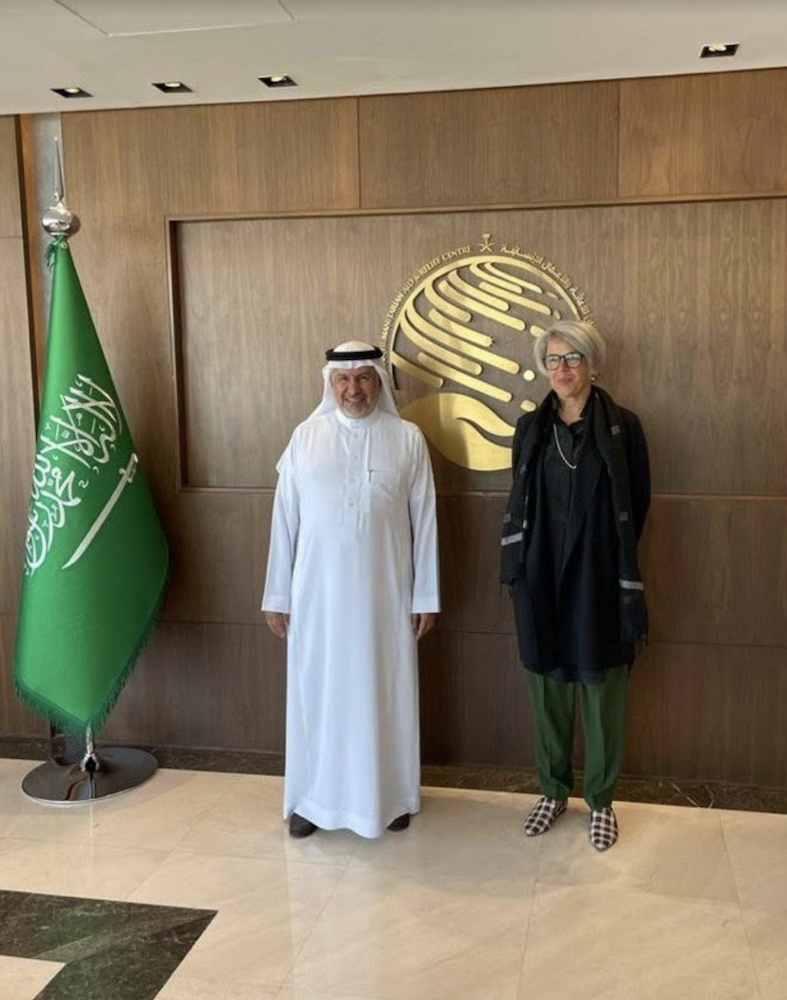 Weber spoke with the KSrelief about the mutual concern surrounding the
effects of conflict in the Horn of Africa, as well as discussions about
opportunities for further KSA-EU cooperation in the region.
Weber spoke with the KSrelief about the mutual concern surrounding the
effects of conflict in the Horn of Africa, as well as discussions about
opportunities for further KSA-EU cooperation in the region.
“It’s a very positive step,” Weber said. “Our understanding, as the EU, has been clear throughout: We saw stability in cooperation between the two sides and in taking into account the declarations of the people in the streets during the 2019 protests.
“We saw stability in having the young generation for the first time being reflected in the future. We saw stability in a mixed government comprising Hamdok and the military. We did not consider the military making its own decisions and disregarding the civilian side as a stable future of Sudan; absolutely not.
“We should not confuse Sudan with other countries in the region. This was not the first time they took to the streets; they have been very clear in their political positions. For them to lamely accept a military takeover was absolutely not acceptable.
“Now the work starts again because they have to convince the civilians on the street that this is actually not a loop, that this is not going back to whenever the military feels they are a bit tired of the civilians it can just move in without them.”
Do external powers, such as the EU, have any leverage or influence over the political and military forces involved in the situation in Sudan?
“We need to have a much more consensus-based understanding because others in the region have more leverage. This is where we need to have a common vision,” said Weber.
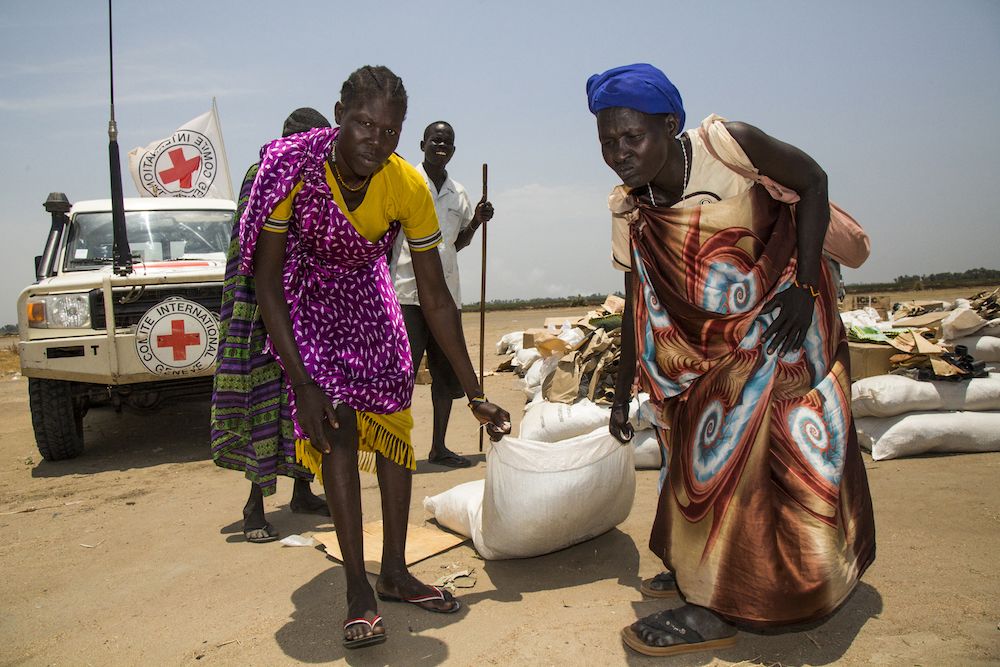 The UN has warned of a growing risk of mass deaths from starvation among
people living in conflict and drought-hit areas of the Horn of Africa.
The UN has warned of a growing risk of mass deaths from starvation among
people living in conflict and drought-hit areas of the Horn of Africa.
“We all have different channels of communication and ways. If we are not the strongest in (engaging with) one side, we might be stronger in (engaging with) the other side. This is why it’s important to have a common understanding of where we want to get to, and use all our (tools of) engagement.”
A German national with more 25 years of experience in the Horn of Africa and Red Sea region, Weber has facilitated peace talks at the highest political levels. She has an established track record of advising the UN, the EU and the German government on the region and has spoken at the Munich Security Conference on regional issues.
Given her background, does she believe the EU realistically can make a difference, given the daunting array of challenges the Horn of Africa faces?
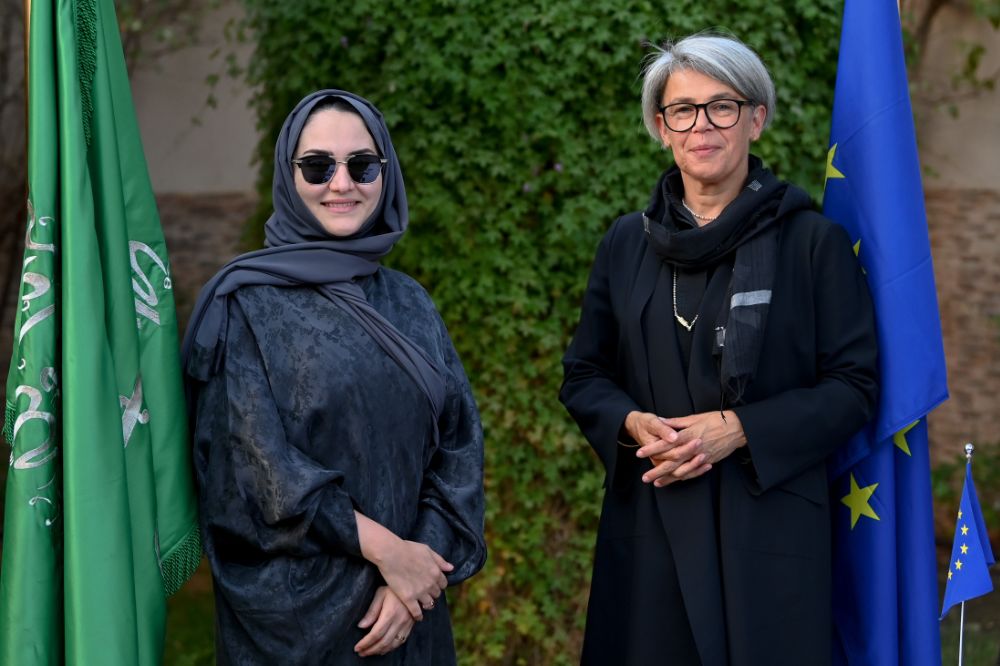 Annette Weber with Assistant Editor-in-Chief of Arab News Noor Nugali.
Annette Weber with Assistant Editor-in-Chief of Arab News Noor Nugali.
“The countries of the Horn of Africa have faced such challenges for decades, even centuries, but we should not overlook that we had two transitions in this region in the past two years,” Weber said. “We had Sudan and we had also a very hopeful transition in Ethiopia. So, to me, things are possible.
“This is where we are supportive of change, where we see a long-lasting strengthening of cooperation, of people feeling they can shape their future and where we can make a difference. But we also have an obligation to ease the pain of the people who are caught up in conflicts.
“I wish we could bring more of a positive engagement, investment (and) energy to these transitions rather than just ease the pain. It’s the people of the (Horn of Africa) countries who have an interest in their own future, in stabilizing and strengthening the region, in interconnecting the region. Not playing against each other but connecting economically, politically and culturally. This is something not for us to do, but we can provide support. This is where I see our role.”










